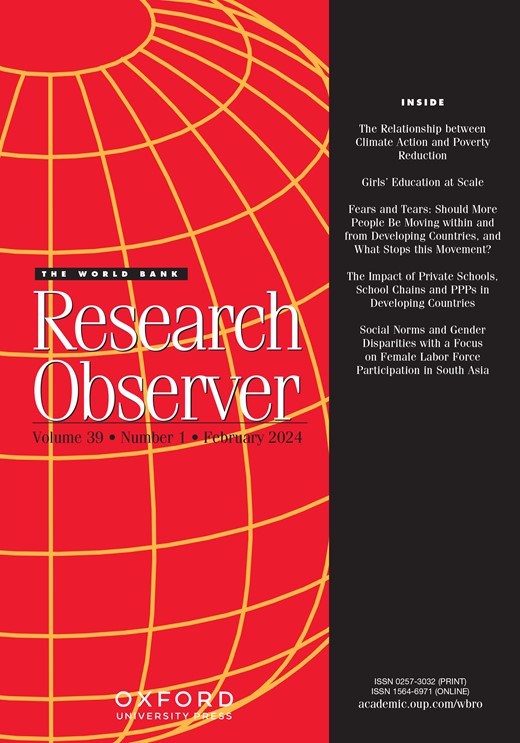Insights on Development from the Economics of Happiness
IF 3.3
1区 经济学
Q1 DEVELOPMENT STUDIES
引用次数: 184
Abstract
The literature on the economics of happiness in developed economies finds discrepancies between reported measures of well-being and income measures. One is the so-called Easterlin paradox: that average happiness levels do not increase as countries grow wealthier. This article explores how that paradox and survey research on reported wellbeing in general can provide insights into the gaps between standard measures of economic development and individual assessments of welfare. Analysis of research on reported wellbeing in Latin America and Russia finds notable discrepancies between respondent assessments of their own wellbeing and income or expenditure based measures. Accepting a wide margin for error in both types of measures, the article posits that taking such discrepancies into account may improve the understanding of development outcomes by providing a broader view on wellbeing than do income or expenditure based measures alone. It suggests particular areas where research on reported well-being has the most potential to contribute. Yet the article also notes that some interpretations of happiness research psychologist set point theory, in particular may be quite limited in their application to development questions and cautions against the direct translation of results of happiness surveys into policy recommendations.从幸福经济学看发展
有关发达经济体幸福经济学的文献发现,报告中的幸福指标与收入指标之间存在差异。一个是所谓的伊斯特林悖论:平均幸福水平不会随着国家变得更富裕而提高。本文探讨了这种悖论和对报告的总体幸福感的调查研究如何能够为经济发展的标准衡量标准与个人对福利的评估之间的差距提供见解。对拉丁美洲和俄罗斯报告的福祉研究的分析发现,受访者对自己福祉的评估与基于收入或支出的措施之间存在显著差异。这篇文章承认这两种测量方法都有很大的误差余地,它认为考虑到这种差异可能会提高对发展结果的理解,因为它提供了一个比单独基于收入或支出的测量方法更广泛的关于福利的观点。它提出了一些特定的领域,在这些领域中,报告幸福感的研究最有可能做出贡献。然而,这篇文章还指出,对幸福研究心理学家设定点理论的一些解释,特别是在应用于发展问题方面可能相当有限,并警告不要将幸福调查的结果直接转化为政策建议。
本文章由计算机程序翻译,如有差异,请以英文原文为准。
求助全文
约1分钟内获得全文
求助全文
来源期刊

World Bank Research Observer
Multiple-
CiteScore
12.60
自引率
1.20%
发文量
8
期刊介绍:
The World Bank Journals, including the Research Observer, boast the largest circulation among economics titles. The Research Observer is distributed freely to over 9,100 subscribers in non-OECD countries. Geared towards informing nonspecialist readers about research within and outside the Bank, it covers areas of economics relevant for development policy. Intended for policymakers, project officers, journalists, and educators, its surveys and overviews require only minimal background in economic analysis. Articles are not sent to referees but are assessed and approved by the Editorial Board, including distinguished economists from outside the Bank. The Observer has around 1,500 subscribers in OECD countries and nearly 10,000 subscribers in developing countries.
 求助内容:
求助内容: 应助结果提醒方式:
应助结果提醒方式:


